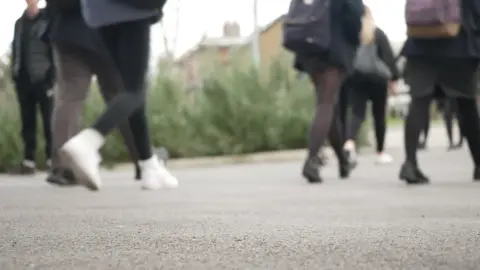School holidays: Should the summer break be halved in Wales?
 Getty Images
Getty ImagesReducing the summer holidays from six to three weeks is one of the options being considered under plans by Welsh government to reshape the school year.
A recent survey on how school terms could be restructured includes three ideas to cut the traditional summer holidays by one, two or three weeks.
The number of holiday weeks would stay the same but be spread out over a year.
The Welsh government said it was considering a range of options prior to holding a formal consultation.
One parent said summer holidays could be stressful, but a teaching union said staff needed the break to "switch off".
The Welsh government has not said when or how any changes would be introduced but the survey has prompted a mixed reaction.
It's part of plans to modernise the academic year, something the first minister has said needs a "radical policy shift".
A pilot is already being rolled out across 14 schools in Wales to extend the school day, adding an extra five hours a week for pupils.
 Getty Images
Getty ImagesBoth plans were part of a co-operation agreement between Welsh Labour and Plaid Cymru in the Senedd.
Teaching unions and school leaders have said research carried out on changing the school year doesn't provide evidence that it would benefit students or staff.
But experts have previously suggested a shorter summer holiday could help pupils from disadvantaged backgrounds.
The Welsh government published an assessment in January which looked at the effects of an alternative school year.
It found that due to mixed and inconclusive evidence to base the review on, thorough evidence gathering would be needed in further planning and consultation stages.

Parent: Six-week school holidays 'stressful'
"I feel quite mixed really," said Charlotte, a mother-of-two from Ferndale in the Rhondda Valley, who said she could see both benefits and issues with changing the school year.
"We've been so used to six-week holidays, but I do feel some of them are a bit long.
"Children can get bored, parents get stressed, so some changes could be welcomed.
"I find it quite hard getting them back into the school mode, so if they were shorter then it wouldn't be so much of a shock the system."

Pupil: Two-week half-terms 'special'
Charlotte's nine-year-old son, Ethan, said shorter summer holidays would help him in class.
"When the teacher says about stuff we learned before the summer holidays, I just don't remember - it's confusing," he said.
He thought longer half-terms as a result of a shorter summer holiday would help break up the school year.
"Half-term feels like something they just randomly do for fun, so two weeks would feel like something special is actually happening," he said. "So, yeah, I like that idea."
Teachers: Short summer holiday a 'disadvantage'
Hugo Hutchison, head teacher at Monmouth Comprehensive School, said that, because of the pandemic, it was not the right time to consider more changes.
"If you look at the research, actually, there isn't any compelling evidence that this would have any advantage for any of our Welsh students, and that seems to be such a poor basis to make such as change," he said.
"It seems instead that Welsh students are the experiment in this and that's unacceptable."
The school is just a mile from the Wales-England border, prompting concern that different term times would be a "real problem" for families using schools in both nations.
Mr Hutchison said: "For families who have primary school students in England with one set of term dates and their secondary school children coming to us in Wales - the family holiday will be entirely split which doesn't seem a fair outcome at all."
He also said changes could have a big impact on staff.
"If we have a shorter summer holiday, something that is seen as a disadvantage in the terms of employment, then staff can very easily go a mile of two over the border and find another job," he said.
"It would be harder to retain staff and recruit new staff."

Teaching union: Changes will lead to 'exodus'
Neil Butler, the national official for Wales with teaching union NASUWT, also believed such changes could cause many to leave the profession.
He called on the Welsh government to press "pause" as unions need to be consulted about the idea.
"By putting this into manifestos and the minister talking about it in the Senedd, it's launched this as something that is now going to happen," he said
"This immediately puts the NASUWT and other education unions on the defence.
"They need to talk to education professionals first and we appear to have been missed out, instead questionnaires and ideas in them have already been distributed."
Mr Butler said the six-week summer holiday was a key time for teachers to switch off from the stress and demand of the job, and get ready for the next academic year.
"If the six weeks were reduced, you'd see a mass exodus from the profession in Wales.
"We would have serious recruiting problems in Wales and see people go to work over the border in England."
Eithne Hughes, director of the Association of School and College Leaders in Wales, asked why Finland's education model, with in excess of 10 weeks of summer holidays, was not "on the table", given it was seen as a "high performing" country.
She told BBC Radio Wales Breakfast that parents and young people worked in the country's tourism sector, so reducing the summer holidays could affect them.
"The other issue that needs to be looked at really carefully is around the recruitment and retention of the [school] workforce," she said.
"We have got a long border with England. We need to ensure we are enticing people into Wales."
What does the Welsh government say?
"Based on our experiences of the last two years where learners, schools and families have adapted to different ways of learning and working, now is the right time to have a serious conversation about the way we structure the school year in Wales," it said.
"We want to look at whether we can design a school year that better supports learner and staff wellbeing, tackles inequality and is more aligned to modern family and working lives.
"This isn't about reducing or increasing the total amount of holidays for learners and teaching staff, but rather the impact of different options in relation to redistributing the holiday periods and term lengths.
"These are at early stages, and we will be carefully considering feedback and the results of surveys, interviews and focus groups which will feed into any options for potentially reforming the school calendar which, of course, would then be subject to a formal consultation."
Watch BBC Wales Live on BBC One Wales at 22:30 GMT on Wednesday, or on iPlayer

- WOMEN OF WALES: Showcasing amazing Welsh female talent and stories
- PEOPLE THOUGHT OF AS BITS OF AN ALGORITHM: Life and death in the warehouse

